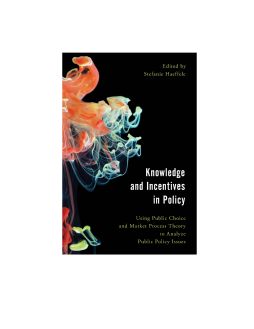
Additional Information
Book Details
Abstract
The relative effectiveness of various institutions, such as the market or government, is based on the ability for individuals to access and use dispersed knowledge in society and the incentives that steer their actions. Market process theory emphasizes the effectiveness of the price system to consolidate and transmit knowledge in the marketplace.
Together this framework provides new insights on the capability of individuals to cooperate and improve society, and the limits to government interventions in society. The original research in each chapter uses this economic way of thinking to analyze a variety of public policy issues, examining the incentives responsible for and the factors that contribute to the creation and effectiveness of the policies. These chapters, authored by public policy practitioners and researchers, tackle such pressing issues as public education, the process for approving medical devices, tax policy, and land use regulation.
Public policies are frequently driven by a combination of good intentions and special-interest politics. Understanding this, Knowledge and Incentives in Policy applies public choice and market process theory to analyse a diverse array of important public policy topics such as foreign aid, environmental protection, and land-use regulations. Equally important, the authors are as diverse as the topics covered.
Robert Lawson, Professor of Practice, Southern Methodist University
Knowledge and Incentives in Policy offers a valuable set of analyses of a variety of local, state, national, and international policy initiatives. Each policy effort is scrutinized with respect to its incentive effects and potential knowledge problems. This volume offers a treasure trove of highly pertinent, timely, and useful examples.
Diana W. Thomas, Associate Professor of Economics, Creighton University
Stefanie Haeffele is the Deputy Director of Academic and Student Programs and a senior fellow for the F. A. Hayek Program for Advanced Study in Philosophy, Politics, and Economics at the Mercatus Center at George Mason University.
Table of Contents
| Section Title | Page | Action | Price |
|---|---|---|---|
| Contents | 7 | ||
| Introduction | 9 | ||
| Part I: International Policy | 15 | ||
| 1 Can Governments Create Bureaucratic Structures That Overcome Knowledge and Incentive Problems? | 17 | ||
| 2 The Political Economy of Intervention in the Conflict against ISIS | 53 | ||
| Part II: Federal Policy | 91 | ||
| 3 FDA Effectiveness Standards | 93 | ||
| 4 Exit, Voice, and Incentives | 111 | ||
| Part III: State and Local Policy | 143 | ||
| 5 Firm-Specific Tax Incentives | 145 | ||
| 6 A Better Tomorrow | 181 | ||
| 7 The Political Economy of Casino Licensing | 201 | ||
| 8 The Political Economy of DC School Choice | 221 | ||
| 9 Stifling Urban Development with Land-Use Regulation | 257 | ||
| Index | 285 | ||
| Editor and Contributors | 303 |
